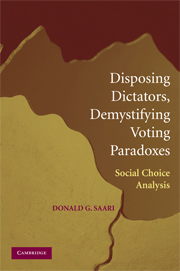2 - Dethroning Dictators
Published online by Cambridge University Press: 24 May 2010
Summary
Rarely does a proposal enjoy a complete consensus; however, the proposition that the field of social choice owes an enormous debt to Kenneth Arrow would pass unanimously. Even though we can debate who should receive credit for siring this academic discipline – Borda, Condorcet, or both – Arrow's insights clearly inspired the modern rebirth of the field. The startling, counterintuitive conclusions of his Ph.D. thesis [2] served as a powerful magnet to attract talented researchers to this area.
Arrow's profound result is negative; it states that it is impossible to do what seems to be obviously possible to do. The astounding nature of his assertion unleashed an avalanche of negative conclusions that seemed to bury us with exasperation: “Is everything that we want to do impossible to do?” The persistence of this theme created a frustrated sense that positive conclusions in this area probably do not exist. This was the prevailing attitude when I moved into this field: The researchers, resembling a gaggle of partying morticians, cheerfully greeted me with this pessimistic commentary. In this chapter, I will provide some hope by showing how and why the situation is nowhere near as dire as these results suggest.
I found it surprising that many of the major negative conclusions have amazingly similar explanations. The value of knowing why these negative results occur is that, often, this information can be used to replace the frustrating negativity with positive assertions.
- Type
- Chapter
- Information
- Disposing Dictators, Demystifying Voting ParadoxesSocial Choice Analysis, pp. 20 - 73Publisher: Cambridge University PressPrint publication year: 2008

